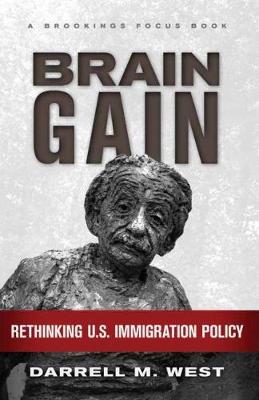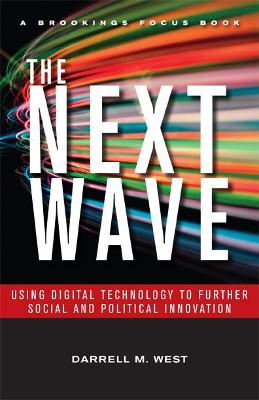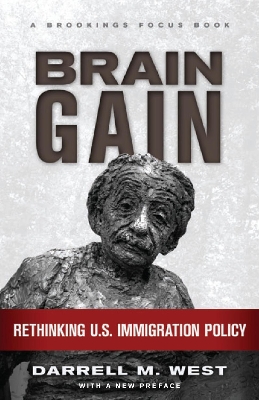Brookings FOCUS Book
3 total works
Many of America's greatest artists, scientists, investors, educators, and entrepreneurs have come from abroad. Rather than suffering from the "brain drain" of talented and educated individuals emigrating, the United States has benefited greatly over the years from the "brain gain" of immigration. These gifted immigrants have engineered advances in energy, information technology, international commerce, sports, arts, and culture. To stay competitive, the United States must institute more of an open-door policy to attract unique talents from other nations. Yet Americans resist such a policy despite their own immigrant histories and the substantial social, economic, intellectual, and cultural benefits of welcoming newcomers. Why?
In Brain Gain, Darrell West asserts that perception or ""vision"" is one reason reform in immigration policy is so politically difficult. Public discourse tends to emphasize the perceived negatives. Fear too often trumps optimism and reason. And democracy is messy, with policy principles that are often difficult to reconcile.
The seeming irrationality of U.S. immigration policy arises from a variety of thorny and interrelated factors: particularistic politics and fragmented institutions, public concern regarding education and employment, anger over taxes and social services, and ambivalence about national identity, culture, and language. Add to that stew a myopic (or worse) press, persistent fears of terrorism, and the difficulties of implementing border enforcement and legal justice. West prescribes a series of reforms that will put America on a better course and enhance its long-term social and economic prosperity. Reconceptualizing immigration as a way to enhance innovation and competitiveness, the author notes, will help us find the next Sergey Brin, the next Andrew Grove, or even the next Albert Einstein.
In Brain Gain, Darrell West asserts that perception or ""vision"" is one reason reform in immigration policy is so politically difficult. Public discourse tends to emphasize the perceived negatives. Fear too often trumps optimism and reason. And democracy is messy, with policy principles that are often difficult to reconcile.
The seeming irrationality of U.S. immigration policy arises from a variety of thorny and interrelated factors: particularistic politics and fragmented institutions, public concern regarding education and employment, anger over taxes and social services, and ambivalence about national identity, culture, and language. Add to that stew a myopic (or worse) press, persistent fears of terrorism, and the difficulties of implementing border enforcement and legal justice. West prescribes a series of reforms that will put America on a better course and enhance its long-term social and economic prosperity. Reconceptualizing immigration as a way to enhance innovation and competitiveness, the author notes, will help us find the next Sergey Brin, the next Andrew Grove, or even the next Albert Einstein.
The digital revolution is in full force but many public and private sector leaders are stymied: How can they maximize the full potential of digital technology? This hesitancy puts a brake on the transformational power of digital technology and means private companies and governmental bodies fall well behind other digital pioneers.
Darrell West focuses on the next wave of technologies and how they can further enhance U.S. social and political innovation. West champions exploiting technological advances to help organizations become faster, smarter, and more efficient. Consumers can deploy new digital technology to improve health care, gain access to education, learn from the news media, and check public sector performance. New storage platforms such as high-speed broadband, mobile communications, and cloud computing enable and improve both social and economic development. However, to gain these benefits, policymakers must recognize the legitimacy of public fears about technology and the privacy and security dangers posed by the Internet. Their goal must be to further innovation and investment while also protecting basic social and individual values.
West argues that digital technology innovation is consistent in many ways with personal and social values; people can deploy digital technology to improve participation and collaboration, and political leaders can work with the private sector to stimulate a flowering of innovation in a variety of policy areas.
Darrell West focuses on the next wave of technologies and how they can further enhance U.S. social and political innovation. West champions exploiting technological advances to help organizations become faster, smarter, and more efficient. Consumers can deploy new digital technology to improve health care, gain access to education, learn from the news media, and check public sector performance. New storage platforms such as high-speed broadband, mobile communications, and cloud computing enable and improve both social and economic development. However, to gain these benefits, policymakers must recognize the legitimacy of public fears about technology and the privacy and security dangers posed by the Internet. Their goal must be to further innovation and investment while also protecting basic social and individual values.
West argues that digital technology innovation is consistent in many ways with personal and social values; people can deploy digital technology to improve participation and collaboration, and political leaders can work with the private sector to stimulate a flowering of innovation in a variety of policy areas.
Many of America's greatest artists, scientists, investors, educators, and entrepreneurs have come from abroad. Rather than suffering from the "brain drain" of talented and educated individuals emigrating, the United States has benefited greatly over the years from the "brain gain" of immigration. These gifted immigrants have engineered advances in energy, information technology, international commerce, sports, arts, and culture. To stay competitive, the United States must institute more of an open-door policy to attract unique talents from other nations. Yet Americans resist such a policy despite their own immigrant histories and the substantial social, economic, intellectual, and cultural benefits of welcoming newcomers. Why?
In Brain Gain, Darrell West asserts that perception or "vision" is one reason reform in immigration policy is so politically difficult. Public discourse tends to emphasize the perceived negatives. Fear too often trumps optimism and reason. And democracy is messy, with policy principles that are often difficult to reconcile.
The seeming irrationality of U.S. immigration policy arises from a variety of thorny and interrelated factors: particularistic politics and fragmented institutions, public concern regarding education and employment, anger over taxes and social services, and ambivalence about national identity, culture, and language. Add to that stew a myopic (or worse) press, persistent fears of terrorism, and the difficulties of implementing border enforcement and legal justice.
West prescribes a series of reforms that will put America on a better course and enhance its long-term social and economic prosperity. Reconceptualizing immigration as a way to enhance innovation and competitiveness, the author notes, will help us find the next Sergey Brin, the next Andrew Grove, or even the next Albert Einstein.
In Brain Gain, Darrell West asserts that perception or "vision" is one reason reform in immigration policy is so politically difficult. Public discourse tends to emphasize the perceived negatives. Fear too often trumps optimism and reason. And democracy is messy, with policy principles that are often difficult to reconcile.
The seeming irrationality of U.S. immigration policy arises from a variety of thorny and interrelated factors: particularistic politics and fragmented institutions, public concern regarding education and employment, anger over taxes and social services, and ambivalence about national identity, culture, and language. Add to that stew a myopic (or worse) press, persistent fears of terrorism, and the difficulties of implementing border enforcement and legal justice.
West prescribes a series of reforms that will put America on a better course and enhance its long-term social and economic prosperity. Reconceptualizing immigration as a way to enhance innovation and competitiveness, the author notes, will help us find the next Sergey Brin, the next Andrew Grove, or even the next Albert Einstein.


